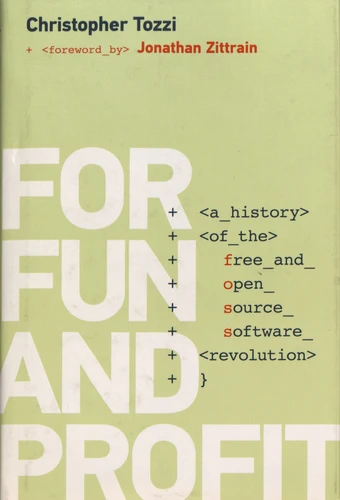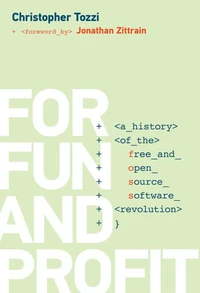For Fun and Profit. A History of the Free and Open Source Software Revolution
Par :Formats :
Définitivement indisponible
Cet article ne peut plus être commandé sur notre site (ouvrage épuisé ou plus commercialisé). Il se peut néanmoins que l'éditeur imprime une nouvelle édition de cet ouvrage à l'avenir. Nous vous invitons donc à revenir périodiquement sur notre site.
- Paiement en ligne :
- Livraison à domicile ou en point Mondial Relay indisponible
- Retrait Click and Collect en magasin gratuit
- Réservation en ligne avec paiement en magasin :
- Indisponible pour réserver et payer en magasin
- Nombre de pages324
- PrésentationRelié
- FormatGrand Format
- Poids0.475 kg
- Dimensions14,1 cm × 21,1 cm × 3,0 cm
- ISBN978-0-262-03647-4
- EAN9780262036474
- Date de parution11/08/2017
- CollectionHistory of Computing
- ÉditeurMIT Press (The)
- PréfacierJonathan Zittrain
Résumé
In the 1980s there was a revolution with far-reaching consequences - a revolution to restore software freedom. In the early 1980s, after decades of making source code available with programs, most programmers ceased sharing code freely. A band of revolutionaries, self-described "hackers," challenged this new norm by building operating systems with source code that could be freely shared. In For Fun and Profit, Christopher Tozzi offers an account of the free and open source software (FOSS) revolution, from its origins as an obscure, marginal effort by a small group of programmers to the widespread commercial use of open source software today.
Tozzi explains FOSS's historical trajectory, shaped by eccentric personalities - including Richard Stallman and Linus Torvalds - and driven both by ideology and pragmatism, by fun and profit. Tozzi examines hacker culture and its influence on the Unix operating system, the reaction to Unix's commercialization, and the history of early Linux development. He describes the commercial boom that followed, when companies invested billions of dollars in products using FOSS operating systems ; the subsequent tensions within the FOSS movement ; and the battles with closed source software companies (especially Microsoft) that saw FOSS as a threat.
Finally, Tozzi describes FOSS's current dominance in embedded computing, mobile devices, and the cloud, as well as its cultural and intellectual influence.
Tozzi explains FOSS's historical trajectory, shaped by eccentric personalities - including Richard Stallman and Linus Torvalds - and driven both by ideology and pragmatism, by fun and profit. Tozzi examines hacker culture and its influence on the Unix operating system, the reaction to Unix's commercialization, and the history of early Linux development. He describes the commercial boom that followed, when companies invested billions of dollars in products using FOSS operating systems ; the subsequent tensions within the FOSS movement ; and the battles with closed source software companies (especially Microsoft) that saw FOSS as a threat.
Finally, Tozzi describes FOSS's current dominance in embedded computing, mobile devices, and the cloud, as well as its cultural and intellectual influence.
In the 1980s there was a revolution with far-reaching consequences - a revolution to restore software freedom. In the early 1980s, after decades of making source code available with programs, most programmers ceased sharing code freely. A band of revolutionaries, self-described "hackers," challenged this new norm by building operating systems with source code that could be freely shared. In For Fun and Profit, Christopher Tozzi offers an account of the free and open source software (FOSS) revolution, from its origins as an obscure, marginal effort by a small group of programmers to the widespread commercial use of open source software today.
Tozzi explains FOSS's historical trajectory, shaped by eccentric personalities - including Richard Stallman and Linus Torvalds - and driven both by ideology and pragmatism, by fun and profit. Tozzi examines hacker culture and its influence on the Unix operating system, the reaction to Unix's commercialization, and the history of early Linux development. He describes the commercial boom that followed, when companies invested billions of dollars in products using FOSS operating systems ; the subsequent tensions within the FOSS movement ; and the battles with closed source software companies (especially Microsoft) that saw FOSS as a threat.
Finally, Tozzi describes FOSS's current dominance in embedded computing, mobile devices, and the cloud, as well as its cultural and intellectual influence.
Tozzi explains FOSS's historical trajectory, shaped by eccentric personalities - including Richard Stallman and Linus Torvalds - and driven both by ideology and pragmatism, by fun and profit. Tozzi examines hacker culture and its influence on the Unix operating system, the reaction to Unix's commercialization, and the history of early Linux development. He describes the commercial boom that followed, when companies invested billions of dollars in products using FOSS operating systems ; the subsequent tensions within the FOSS movement ; and the battles with closed source software companies (especially Microsoft) that saw FOSS as a threat.
Finally, Tozzi describes FOSS's current dominance in embedded computing, mobile devices, and the cloud, as well as its cultural and intellectual influence.


